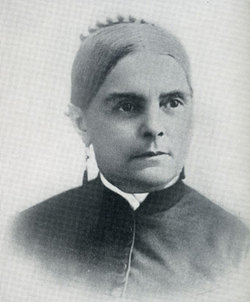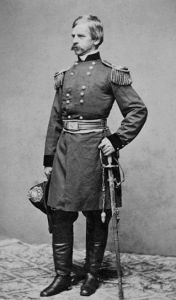From The Doorstep: Winchester Women Record Evacuation & Occupation, Part 1
 It is a truth (mostly) universally acknowledged that if you want the long version of a story, ask a woman. I say this not as criticism, but rather as praise Civil War women and their primary sources. After recording the podcast with Chris and Dan, I started thinking about an event that illustrates an intersection of women’s voices telling military happenings during the 1860’s conflict. Although there are numerous accounts to highlight, here’s one that is especially interesting.
It is a truth (mostly) universally acknowledged that if you want the long version of a story, ask a woman. I say this not as criticism, but rather as praise Civil War women and their primary sources. After recording the podcast with Chris and Dan, I started thinking about an event that illustrates an intersection of women’s voices telling military happenings during the 1860’s conflict. Although there are numerous accounts to highlight, here’s one that is especially interesting.
On March 11, 1862, Confederate General Thomas J. Jackson and his troops left Winchester, Virginia. The general had held a council of war which had determined – against his own wishes – to abandon the town and move further up (south) in the Shenandoah Valley. Logically, this maneuver would cover Joseph Johnston’s flank east of the Blue Ridge Mountains and maintain communication while seeking better battleground than defending a city.

However, Jackson, many of his soldiers, and certainly most of the civilians in Winchester opposed the movement. The citizens had been protesting such “abandonment” since the previous July, claiming that their boys ones had enlisted to defend their homes, their portion of the Shenandoah Valley; if that were true, why did these locally recruited units keep leaving? Also, the horror stories of Yankees had become the bugbears of Winchester, and not many anticipating seeing real, live Yankees in town. With Jackson and his soldiers pulling out of town, the town would be at the mercy of “the invaders.”
Meanwhile Union General Nathaniel P. Banks and a Federal army approached Winchester from the north, heading into the Shenandoah Valley. They were not the first Yankees in the Valley, but they would be the first to march into Winchester as conquerors. While McClellan moved on Richmond via the Peninsula, these men in the Valley would keep an eye on Jackson…or Jackson would keep an eye on them. McClellan had ordered Banks to protect the Baltimore and Ohio Canal and other transportation and communications along the Potomac from Jackson’s raids and Ashby’s cavalry.
First in their advance, the Union boys needed a headquarters, supply base, and hospital network; Winchester – the largest town in the northern part of the Valley – offered a prime location and starting point for the rest of the campaign. It seemed encouraging that Jackson left town so quickly, leaving them to take over the streets, homes, and chicken coops of the local “disloyal” citizens.
Several women in Winchester kept private journals of their experiences during the war, giving varying views on the events happening in their town. Here are excerpts from their diaries on March 11 and 12, 1862. Some gave long and emotional versions of the happenings, but nonetheless, recorded history and captured details that many men were simply too busy to write at that moment. They were women—housewives and mothers—but they witnessed and recorded military history.

Cornelia Peake McDonald, a mother with several young children, actually started her wartime journaling on March 11. Her husband had asked her to keep a record of what happened during his absence, but the diary soon became her personal observations and secret keeper.
On the night of March 11th, 1862, the pickets were in the town; part of the army had already gone, and there were hurried preparations and hasty farewells, and sorrowful faces turning away from those they loved best, and were leaving, perhaps forever. At one o’clock the long roll beat, and soon the heavy tramp of the marching columns died away in the distance.
The rest of the night was spent in violent fits of weeping at the thought of being left, and of what might happen to that army before we should see it again. I felt a terrible fear of the coming morning, for I knew that with it would come the much dreaded enemy.
I laid down when the night was almost gone, to sleep, after securing all the doors, and seeing that the children were all asleep. I took care to have my dressing gown convenient in case of an alarm, but the night passed away quietly, and when the morning came, and all was peaceful I felt reassured, dressed and went downstairs.
The servants were up and breakfast was ready. The children assembled and we had prayers.

I felt so thankful that we were still free, and a hope dawned that our men would come back, as no enemy had appeared. We were all cheerfully despatching[sp] our breakfasts, I feeling happy in proportion to my former depression; the children were chatting gaily, Harry and Allen rather sulky at not having been permitted to leave with the army, as they considered it degradation for men of their years and dimensions to be left behind with women and children. Suddenly a strain of music! Every knife and fork was laid down and every ear strained to catch the faint sounds. The boys clap their hands and jump up from the table shouting. “Our men have come back!” and rushed to the door; I stopped them, telling them it must be Yankees. Every face looked blank and disappointed.
I tried to be calm and quiet, but could not and so got up and went outside the door. Sure enough that music could not be mistaken, it was the “Star Spangled Banner” that was played. A servant came in. “They are all marching the town, and some have cover over the hill into our orchard.”[i]
Meanwhile, Julia Chase recorded some different farewells. She and her family supported the Union and their Confederate neighbors knew it. While Jackson’s retreat and Banks’s advance should have been welcome news, it also brought troubles. On March 10, 1862, Julia – who had been journaling since 1861 – recorded that some of her pro-Union friends had been thrown in the guard house and more were expected to be arrested, including her father. If the Confederates left, the leading Unionists of Winchester were coming with them – no further questions.
March 11, 1862
Our fears are more than realized. Father has been taken to the guard house, there about 2 ½ hours, and then hurried off to Strasburg. I saw him twice before he took his final leave, but oh, how indignant I felt towards the whole town. To take an old man lying sick on the sofa is outrageous, but we hope for the best, tho’ we look upon it as a high handed piece of business. Mr. Geo. Aulick, Besore, Sydor, York, and others were carried off as prisoners also. The older men had the privilege of riding to Strasburg by paying their fare. The rest had to walk. Sad, sad day to us.

March 12, 1862
Glorious news. The Union Army took possession of Winchester today and the glorious flag is waving over our town, but oh, if the troops could only have come a day or two sooner, then our people would have escaped the clutches of the Southern Army. We suppose the destination of the prisoners will be Richmond. God forbid they should reach that city while Jeff Davis reigns there. If does us some good to see some one outside of Dixie, and we hope the troops will show by their conduct to the Virginians that they are not all monsters and have not come for the purpose of cutting their throats & destroying their homes.[ii]
Whether they welcomed or feared the “Star-Spangled Banner,” Cornelia McDonald and Julia Chase recorded the war from their doorsteps. They noted the treatment of loyal citizens, the sounds of war, and the “hurried preparations” as Jackson departed and Banks arrived, including time and specific marching tunes.
However, other women recorded more details about military men, and their words provide valuable details about officers, regiments, and men who left town and those who entered.
To be continued…
Sources:
[i] McDonald, C. P., edited by Minrose C. Gwin (1992). A Woman’s Civil War: A Dairy, with Reminiscences of the War, from March 1862. New York, NY: Gramercy Books. Pages 23-24.
[ii] Chase, J., edited by Michael G. Mahon (2002). Winchester Divided: The Civil War Diaries of Julia Chase & Laura Lee. Mechanicsburg, PA: Stackpole Books. Pages 21-22.
The women of Winchester were a feisty lot. During one hasty evacuation by Union forces several of the women took shots at the rapidly departing soldiers. One account indicates that a soldier shot back, blowing a woman back into the house. A “Civil War” indeed!
“if you want the long version of a story, ask a woman.” Having been married almost 40 years to my first wife, I would concur. 😉 Great article Ms. Bierle!